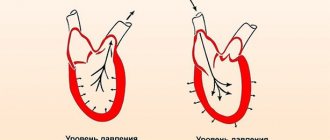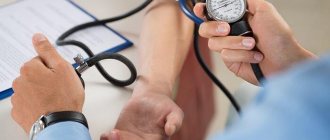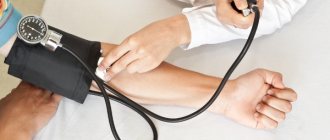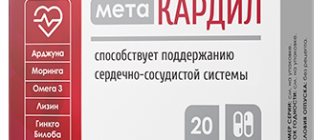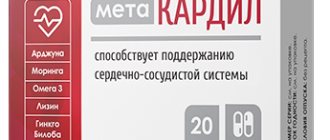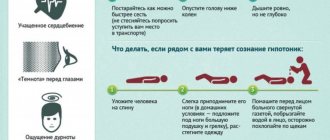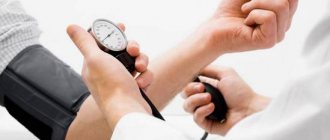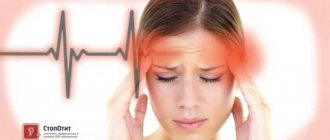Pressure surges can be associated with several reasons that can only be determined by the attending physician. Taking into account the specific cause, therapy is prescribed, which should bring blood pressure levels as close as possible to normal readings in order to improve the patient’s quality of life. Below we will discuss the main factors influencing pressure surges.
Medical certificate
The absence of problems with blood pressure is a sure sign of healthy functioning of the body. When natural mechanisms are disrupted, malfunctions occur, resulting in pressure surges. They have a much worse effect on the condition of the main organ systems than constant hypotension or hypertension. A change in readings even by 20% within one hour (for example, from 140/80 mm Hg to 160/100 mm Hg) is dangerous due to disruptions in the functioning of the brain and heart. This clinical picture indicates serious pathologies and can cause a heart attack or stroke.
Physiology of normal pressure
During contraction of the left ventricle, blood from the heart enters the bloodstream. This is the systole phase. It provides systolic pressure. Then the myocardium relaxes or the diastole phase occurs. The pressure that blood vessels exert on the blood flow is called diastolic.
Normally, in a healthy person, fluctuations in systolic pressure are possible within the range of 100-140 mmHg. Art., and diastolic - 60-90 mm Hg. Art.
During the day, under the influence of various reasons (stress, overexertion, emotional outbursts), minor changes in blood pressure are likely. This is a completely normal reaction on the part of the body, which is thus trying to adapt to changing exogenous and endogenous factors. Allowable fluctuations in systolic pressure are 33 mmHg. Art., and diastolic - 10 mm Hg. Art. per day.
Angina is a serious disease that can persist for a long time. Therefore, it is important for patients to know how to effectively treat pathology at home using traditional and modern medicine. Read more in the article: “how to get rid of angina forever.”
All the reasons why a person’s blood pressure fluctuates are usually divided into physiological and pathological. The first category includes weather changes, intense physical activity, cyclical hormonal changes, experiences and dietary features when a person consumes too much energy drinks or coffee. Against this background, pressure readings often shift upward to compensate for the organs’ needs for increased blood supply.
Pathological causes of surges
Instability of atmospheric pressure entails instability of arterial pressure. The so-called weather-dependent people are at risk. They always react to changes in climate or weather. Pathological causes of blood pressure surges can also be diseases of internal organs or hormonal disorders:
- Vegetative-vascular dystonia. The disorder most often occurs in women aged 16 to 35 years.
- Pathologies of the myocardium, entailing the loss of its full contractility (cardiac ischemia, angina pectoris and rest).
- Impaired functioning of the kidneys and urinary system (pyelonephritis, renal failure, nephropathy).
- Encephalopathy, brain tumors of various origins.
- Cerebrovascular accident. Usually we have to talk about pressure surges with cervical osteochondrosis, compression of the arteries feeding the cerebral structures.
- Hormonal imbalance caused by pathologies of the thyroid gland and adrenal glands.
- Uncontrolled use of certain medications (Bisoprolol, Anaprilin, Concor).
During any pathology, several stages are distinguished from the list. However, pressure instability usually occurs as the disease begins to progress. In rare cases, surges in blood pressure accompany the manifestation of the disease.
Advertising:
In women and men
Fluctuations in blood pressure in the fair sex can be caused by the onset of menstruation. This condition is not a pathology and involves hypotension due to physiological blood loss. No specific therapy is required.
With coronavirus, various symptoms appear, one of them is dizziness, combined with malaise and deterioration in well-being. Since similar symptoms occur in other pathologies of viral origin, differential diagnosis is required. Read more in the article: “dizziness with coronavirus in adults.”
Pregnancy is another reason why blood pressure fluctuates (either high or low). Changes occur in the body at the hormonal level, the nature of nutrition, toxicosis, and the experiences of the expectant mother. In the first months of gestation, blood pressure is usually low. If you feel normal, it should not cause concern.
When menopause occurs, the body experiences extreme stress. Serious hormonal changes occur, the amount of estrogen decreases. Vessels lose collagen, which gives them elasticity. While adaptation to the new state continues, blood pressure may fluctuate.
Instability of blood pressure readings in men is rare.
However, compared to women, they take less care of their health and rarely follow the rules of a balanced diet. They drink alcohol and smoke much more often. The listed factors negatively affect pressure indicators, causing sudden jumps.
Why does blood pressure jump during menopause?
During menopause, approximately 50-70% of women, according to various statistics, suffer from a similar pathology. This condition may be associated with several reasons, which are most acute during this period of a woman’s life.
During menopause, the weaker sex is extremely sensitive to foods high in salt, which leads to fluid retention in the body. In addition, many people begin to gain weight. Even a slight deviation from your previous weight can trigger a problem.
Exacerbating the problem during menopause is hormonal therapy, which may be prescribed to relieve other symptoms of the condition. As a result, even greater hormonal imbalance causes a deterioration in the functioning of the cardiovascular system, which means pressure surges become even more frequent.
Attention! Typically, in the ratio of high and low blood pressure, patients most often have higher systolic pressure values. It is registered 25% more often.
In old age
Today, both teenagers and elderly patients complain of pressure surges. In the first case, health problems are usually caused by hormonal changes in the body, and a corresponding comprehensive examination of the child proves this. If during the diagnosis no significant health problems are identified, most likely he will “outgrow” the instability of pressure. As the body ages, older people often experience increased blood pressure, which needs to be controlled, including with medication.
Some of them take pills irregularly and do not follow the regimen. As a result, the pressure constantly fluctuates. Another reason for this pathology is self-medication. Many older patients violate the dosage of the prescribed drug or change the drug without permission. As a result, an elderly person’s blood pressure increases, he ignores the symptoms and does not consult a doctor. This is very dangerous due to the risk of vascular accident.
How to recognize pressure surges?
Advertising:
A variety of factors can lead to pressure surges. Therefore, it is necessary to be careful about your own health. People who have already encountered this problem note the appearance of characteristic symptoms:
- change in complexion (from white to reddish);
- weakness throughout the body;
- tremor of the limbs;
- feeling of lack of air;
- the appearance of vomiting, nausea;
- pain in the heart area;
- fainting;
- increased heart rate.
Dizziness and headaches, shortness of breath, blurred vision - these and the symptoms presented above signal health problems. In this case, it is necessary to immediately measure the pressure. During the procedure, the hand should remain calm. It is recommended to measure indicators every 20 minutes for two hours. If this situation repeats, you need to consult a doctor to examine the body for pressure surges, the reasons for either high or low readings.
Symptoms of pathology
Jumps in blood pressure are accompanied by characteristic symptoms, and if you take the medications prescribed by your doctor on time, you will be able to avoid a severe deterioration in your condition. The main symptom that is characteristic of sharply increasing and decreasing blood pressure is a severe headache. With high blood pressure, the pain is concentrated in the temporal part, and with low blood pressure, the back of the head hurts, and less often, discomfort is felt in the forehead area. In addition to pain, the patient feels dizzy, shows signs of indigestion, and also:
- vision and hearing are impaired;
- the skin becomes red or pale;
- dizziness and nausea are accompanied by bouts of vomiting;
- breathing becomes difficult;
- upper and lower limbs go numb;
- breaks out into a cold, then into a hot sweat;
- I am worried about severe chest pain.
Drug treatment is prescribed exclusively by a doctor.
When such symptoms develop, it is dangerous to try to cope with the problem yourself, and to avoid serious complications, it is better to call an ambulance. On the spot, the doctor will initially assess the extent of the problem, and if necessary, suggest hospitalization with a detailed examination that will help identify the causes of pressure surges. In the case where the attacks are periodic, and after taking medications the condition returns to normal, the doctor will prescribe a treatment regimen at home, as well as prescribe medications that can normalize the condition in a short time.
First aid for an attack
Advertising:
If a person’s blood pressure has increased or decreased significantly, the first thing to do is to calm him down. At such moments, a feeling of fear appears, which quickly develops into a panic attack. You should try to find out why the attack happened, eliminate the cause if possible and call a team of medical workers.
Before their arrival, you should open all the windows in the room, thereby ensuring an influx of fresh air. It is better to remove clothing from the upper part of the body so that it does not put pressure on the chest and does not interfere with breathing fully. Subsequently, all actions will depend on pressure indicators.
| Hypertension after lowering blood pressure | Hypotension after increased blood pressure |
| The person must be placed in a semi-sitting position. This will prevent blood from rushing to your head too quickly. | Place the victim in a horizontal position with his legs slightly elevated. To do this, place a pillow under your knees. |
| Give any pill for hypertension (for example, Anaprilin). | Give a Caffeine tablet to increase blood pressure. If medications are not available, they can be replaced with a cup of sweet coffee or a glass of salted water. |
| For pain in the heart, put Nitroglycerin under the tongue. |
During the provision of assistance, it is advisable to measure blood pressure every 15 minutes before the ambulance team arrives and record the readings in writing. Then they need to be handed over to doctors. This approach will allow specialists to immediately assess the clinical picture and take the necessary measures.
How to treat?
Treatment with medications
The tablet should not be swallowed whole.
If blood pressure has increased sharply, it is recommended to take a Captopril or Nifedipine tablet under the tongue, lie down in a comfortable position, and wait until the condition returns to normal. If after half an hour the medicine has not given any effect, you should take the medicine again. If the condition does not stabilize, the patient becomes worse, stop taking the medications and immediately call an ambulance. If the patient has become restless, you can take Corvalol, Barboval, or valerian.
They say that low blood pressure is safer than high blood pressure, but you should not ignore the problem, since even with extremely low blood pressure the situation can have serious consequences. If your blood pressure drops sharply, you should immediately drink a cup of sweet tea or coffee. You can take medications such as “Citramon”, “Pentalgin”, and in order for the pressure to return to normal, it is recommended to take courses of the homeopathic remedy “Tonginal”.
Which doctor should I contact?
Advertising:
Most people with hypotension know that at home they can normalize blood pressure using ginseng or eleutherococcus. In the case of hypertension, the situation is somewhat more complicated. Experts do not recommend folk remedies or self-medication due to the high likelihood of complications. Therefore, if there are regular pressure surges (either high or low), you need to consult a therapist and undergo examination by specialized specialists. These are a cardiologist, an ophthalmologist, a urologist, a neurologist and an endocrinologist.
To determine pressure surges, you should monitor the indicators over time - take measurements several times a day and record all the results.
The procedure itself is carried out at home, but more often 24-hour blood pressure monitoring is used during diagnosis. To do this, a cuff is placed on the patient's shoulder, and a special monitor is attached to a belt or lower back.
The device automatically saves the values at the right time. There is no need for a person to behave in a special way. He can do his usual activities and go to work. A systematic approach allows us to establish the presence of arterial hypertension and hidden pathologies of the cardiac system. Additionally, you may need to take a general blood test and hormone tests, do an EEG and ECG, and angiography of vessels of various locations. After determining the reason why the pressure fluctuates throughout the day, the physician will be able to select adequate therapy.
What to do if the pressure jumps?
It is advisable to deal with unstable blood pressure under the supervision of a doctor.
He will make a diagnosis, identify the cause and prescribe treatment. However, even before consulting a specialist, you can conduct your own diagnosis. To do this, it is necessary to measure the pressure every few hours and record the data. Subsequently, together with the doctor, analyze the etiology of the surges: what catalyzes the increase or decrease, how quickly the indicators are restored. A specialist will tell you how to measure pressure correctly in order to recognize the causes of changes. Watch the video:
It is important for people with unstable blood pressure to be able to act correctly in emergency situations – that is, sudden changes in blood pressure. The principles of emergency care before the ambulance arrives are as follows:
- If there is a strong decrease in the usual indicators, you need to take a horizontal position, place your legs above the level of your head, massage your hands, normalizing blood circulation. To improve your condition, you can drink a caffeine-containing drink, eat a piece of sugar, or use natural decoctions (schisandra, ginseng, etc.). When the pressure is unstable, you should not make sudden movements.
- A contrast shower, the use of a diuretic and subsequent provision of complete rest will help to urgently reduce a sudden increase in indicators. You can put a warm heating pad on your feet and normalize your heartbeat with breathing exercises.
Taking medications
Treating pressure changes requires a lot of time and effort. Therapy is carried out under the supervision of several specialists simultaneously and depends on the root cause of the disorder. Usually high blood pressure is treated, and low blood pressure is tried to be normalized using folk methods and lifestyle changes. If the disorder progresses against the background of vegetative-vascular dystonia, it is necessary to normalize the functioning of the nervous system. For this purpose, various sedatives are used (tincture of motherwort or valerian root, Glycine). For panic attacks, doctors prescribe tranquilizers and antidepressants.
In case of arterial hypertension, ACE inhibitors (Enalapril, Lisinopril), calcium channel blockers (Verapamil) are used. It is mandatory to take diuretics and beta blockers. There are also combined drugs for hypertension, for example, Andipal. It is important to understand that treatment with antihypertensive drugs is a long process. You should not suddenly stop taking medications, because this can provoke new pressure surges.
Preventive measures
Prevention is not very difficult. You need to follow simple tips:
- You should not consume salt in excessive quantities. But you shouldn’t completely abandon this product. Everything is at the discretion of the specialist. It would be a good idea to consult a nutritionist to adjust your diet.
- The diet needs to be changed: more plant foods, less fatty, fried, smoked, sweet. No canned or semi-finished products. They are too salty.
- You need to adhere to an optimal physical activity regimen. No overload. Light therapeutic exercises only. Otherwise, there is a high risk of stroke or heart attack.
It is also recommended to regularly undergo preventive examinations from the specialists described above. In the system, this is enough to stabilize blood pressure.
Sudden changes in blood pressure are fraught with dangerous complications, sometimes fatal. Urgent qualified medical assistance is needed. Treatment is carried out under the supervision of a doctor. Amateur activity is strictly unacceptable. The consequences can be unpredictable.
Non-drug methods for correcting the condition
Advertising:
An important component of complex treatment of the problem is non-drug treatment. Its goal is to minimize the risks of hypotension or hypertension. Supportive activities do not require significant financial costs and come down to the principles of a healthy lifestyle:
- Dosed physical activity, including in old age.
- Regular hardening through a contrast shower and dousing with cold water.
- A balanced diet while limiting excessively fatty and fried foods.
- Fractional meals (it is better to eat often, but in small portions).
- The diet should be dominated by fresh vegetables and fruits, fish, and a variety of cereals.
- Compliance with the work and rest regime. Daily night sleep should be about 8 hours.
- Elimination of all bad habits.
- Control of stress and psycho-emotional experiences.
In the case of a hereditary predisposition to hypertension or hypotension, it is important to regularly measure blood pressure. People over 50 years of age at risk need to take appropriate medications for preventive purposes. If pressure surges are regular, serious drug treatment is required.
Is it possible to cure blood pressure surges without medications?
Usually, you can rid yourself of taking medications only at the beginning of the manifestation of the pathology. With moderate severity of the patient’s condition and with an already advanced disease, only traditional treatment can help completely eliminate the symptoms. But the recommendations described below can significantly improve your well-being even with serious jumps in blood pressure. These tips include:
- stop drinking alcohol;
- give up cigarettes or significantly reduce the number of cigarettes smoked;
- Eliminate fatty and salty foods from the diet as much as possible;
- consume only complex carbohydrates, which are found in cereals and whole grain bread;
- do not overeat, and this rule also applies to healthy foods;
- try to reduce body weight to a normal BMI;
- give up strong coffee and tea;
- significantly reduce the amount of salt and sugar in the food consumed; even a slight reduction in them in the diet leads to a healthier body.
Attention! You should check with your doctor about the possibility of sports activities. But activities such as swimming and walking are recommended for absolutely all patients.
Video - How to normalize blood pressure
Traditional methods of treatment
As an additional measure to eliminate unstable blood pressure, you can use recipes from traditional healers. The main goal of such therapy is to strengthen the walls of blood vessels and increase their elasticity. Tinctures and decoctions prepared from medicinal herbs help cleanse arteries, prevent clogging, and improve the functioning of the heart and kidneys. As a result, normalization of blood pressure indicators is observed.
Rose hips contain a large amount of vitamins. They have a positive effect on the functioning of the heart and the state of the nervous system. It is better to brew rosehip in a thermos overnight, and drink it like regular tea in the morning. You can prepare a tincture based on these fruits. You will need to pour vodka into the rose hips in a ratio of 1:5. Take the composition 10 drops 2 times a day, after diluting it in a small amount of water.
Honey is useful for pressure surges, because it makes blood vessels more elastic and improves the overall composition of the blood. A small amount of it should be mixed with 2 tablespoons of aloe, 3 cloves of garlic and the juice of a whole lemon. The finished product should be stored in the refrigerator. Take a teaspoon of juice to cleanse blood vessels.
